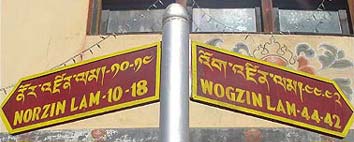|
Dzongkha:
Bhutan's national language
|
 |
Bhutan's
Culture: Dzongkha |
|
 |
Bhutan Information |
|
|
 |
|
English
Dzongkha dictionary goes to print
|
 |
 |
| Autism,
biopsy, love, consortium, ranch, nuclear-bomb- these are some of the English
words concisely explained and defined in different senses in Dzongkha in
the first comprehensive and expanded English - Dzongkha dictionary that will be released sometime in July 2006 by the Dzongkha Development
Authority (DDA). |
|
The
30,000 word dictionary with over 90,000 Dzongkha equivalents, which
was developed over more than four years, is described as the first of its
kind that fulfills the dictionary criteria.
Researcher
Pema Wangdi explained that unlike the available materials, the new dictionary,
which is based on the Oxford Popular School Dictionary and the Oxford Advanced
Learner's Dictionary, tries to distinguish different word senses in a series
of numbered equivalence. "If not then we have tried to define the English
word in its closest Dzongkha equivalent," he said, adding that this allowed
people more choices to pick and choose words to fit their context.
However,
the definitions are not strictly restricted to Dzongkha only. The experts
point out that for some English words whose equivalence are not found in
the Dzongkha vocabulary have been borrowed from Choeked (classical Tibetan
text) and other regional dialects such as Tshangla, Bumthap, and many others.
For
example, the word 'gowtshor' in Brokpa snugly fit the word 'love' in English,
both in its verb and noun usage. "We have tried to put meaning by using
words from other languages that explains the English equivalent beautifully,"
he pointed out.
Kharang,
kotkin, tshemto, modhuphala (for papaya in Tshangla) are some words incorporated
in the dictionary.
But
Pema Wangdi explained that only those regional words that follow similar
Dzongkha sound system and are easy to spell in Dzongkha have been taken
into account "to avoid confusion".
With
over 30,000 words as the main entries, the researchers are convinced that
except for cultural specific words, most of the words in the English vocabulary
have been incorporated in the new dictionary.
Civil
servants, translators, interpreters, and students are the target readers,
the authority officials said. Senior reader, Dorji Gyeltshen, said that
the sole purpose of the dictionary is to promote Dzongkha language through
English. "With this publication people should now be able to use Dzongkha
more frequently and in its correct form," he said.
The
dictionary is simple and straightforward, and the spellings simplified,
said Pema Wangdi. The headwords, which are the general root words, are
arranged in alphabetical order with no phonetics and no grammatical information.
Pema Wangdi said that the need was not called for because such facilities
are available in the English dictionaries which are found in abundance.
Developed
over a series of meetings where the experts deliberated on endless debates
and discussions, the dictionary would be provisional and subject to further
discussions and changes as per the feedback from the readers. "As soon
as we start getting comments from the readers we will start the second
edition," said Dorji Gyeltshen.
The
DDA will print about 3,000 copies, which will be distributed to schools
and various government departments and sectors, free of cost.
| Contributed
by Karma Choden, KUENSEL, Bhutan's National Newspaper, June 2006 |
 |
| Information on Bhutan |
 |
| Links |
 |
 |
 |
External
Links |
|




